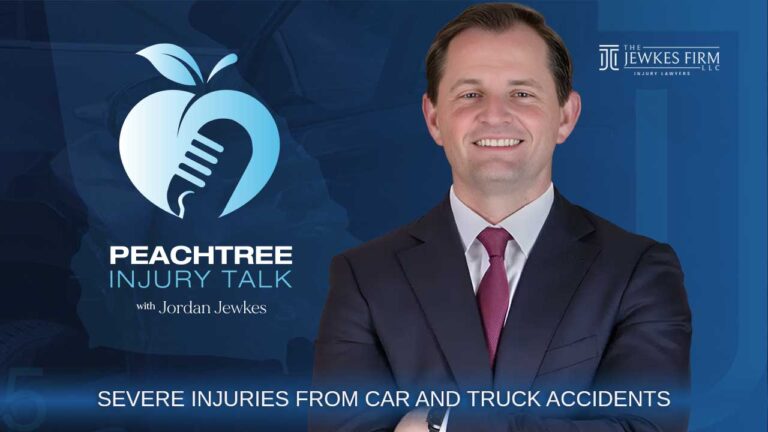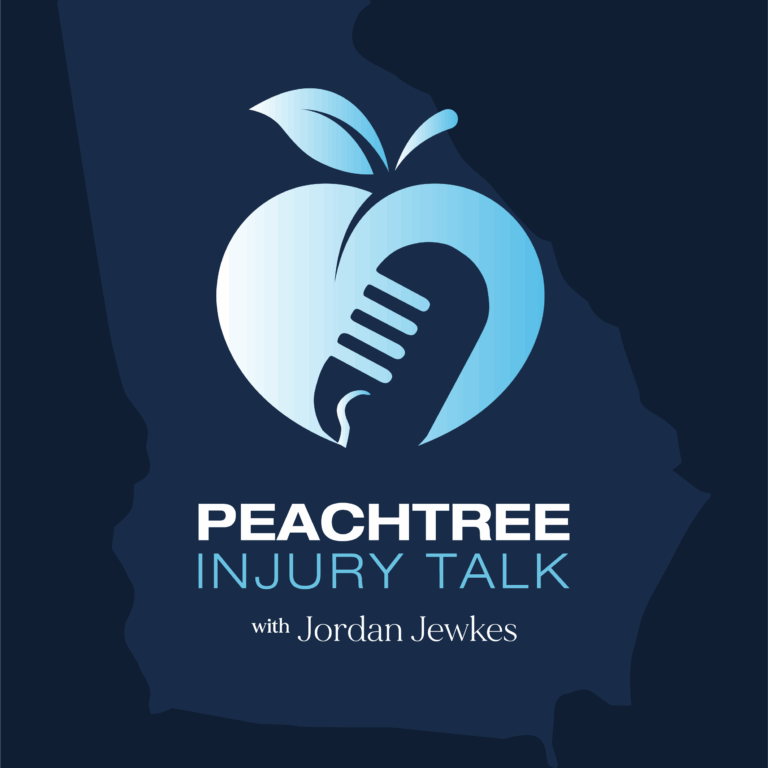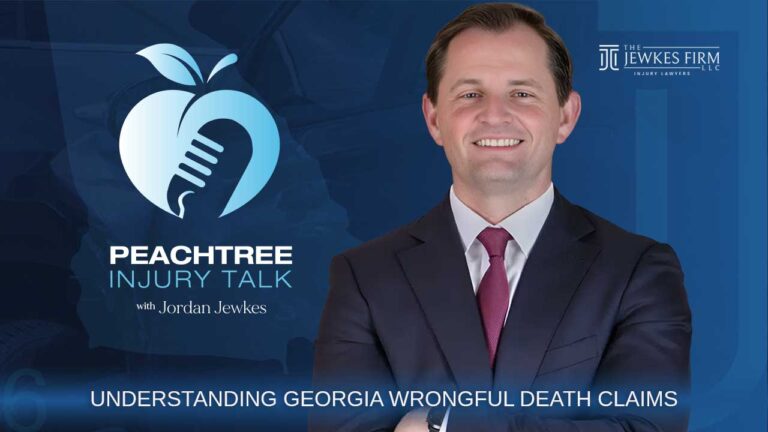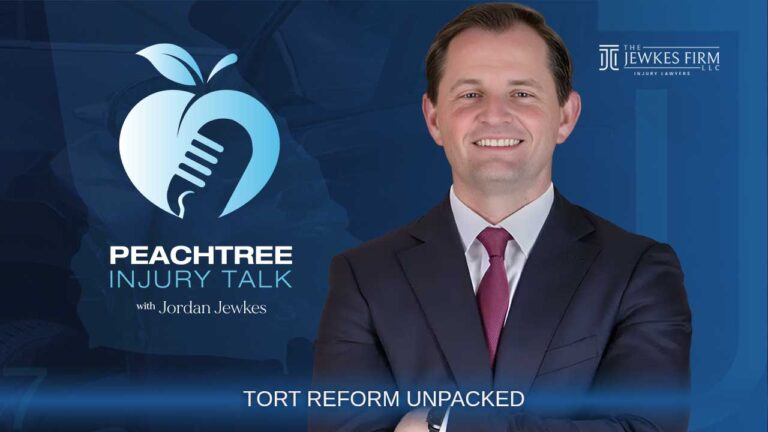
Severe Injuries Resulting from Car and Truck Accidents in Georgia
In this episode of Peachtree Injury Talk, attorney Jordan Jewkes discusses severe injuries that result from car and truck accidents in Georgia. He highlights common
Home | Podcasts | Peachtree Injury Talk | Litigation — What’s the Process and Why Does It Seem to Take So Long?
Peachtree Injury Talk with Jordan Jewkes
In this episode of Peachtree Injury Talk, attorney Jordan Jewkes explains the litigation process, why it can be time-consuming, and what injured victims should expect when filing a lawsuit. He covers the key stages of litigation, from filing a complaint to trial, and highlights why most cases settle before reaching court. Jordan also discusses the discovery process, depositions, mediation, arbitration, and the role of the judge throughout litigation. If you’ve ever wondered why legal battles seem to drag on, this episode breaks it all down in simple, understandable terms.
| 00:00 | Narrator: Welcome to Peachtree Injury Talk with attorney Jordan Jewkes. |
| 00:05 | Kevin Rosenquist: Hello and welcome to Peachtree Injury Talk with Jordan Jewkes. Jordan strives to give injured victims a voice and provides strong advocacy against an often broken system. I am your host, Kevin Rosenquist, and today's episode is "Litigation – What's the process and why does it seem to take so long?" Jordan, great to see you again. |
| 00:25 | Jordan Jewkes: Always a pleasure to be here with you, Kevin. Thank you so much. |
| 00:27 | Kevin Rosenquist: Alright, so let's talk about the basics here. What does litigation entail, and how does it differ from simply filing a claim? |
| 00:36 | Jordan Jewkes: Litigation, in the most basic sense, is when a claim becomes a lawsuit. In most counties, you go to the courthouse and file what's called a "complaint" and a "summons," and then serve those on the at-fault party. That’s the official start of the litigation process—filing a lawsuit. |
| 01:01 | Kevin Rosenquist: We talked in the last episode about how only a small percentage of your cases go to trial. What are the common reasons a case would actually make it to trial instead of settling? |
| 01:16 | Jordan Jewkes: Yeah, good question. In our practice, it’s probably only 1–2% of cases that go to trial. And when I say trial, I mean the full jury trial with a judge, 12 jurors, opening statements, witnesses, and so on. Most lawsuits never reach that stage. In fact, about 80% of our cases settle without even filing a lawsuit. And of those we do file, about 97% never go to trial. So really, litigation is the journey from filing the lawsuit to getting a trial date—and that process can take a long time. |
| 02:17 | Kevin Rosenquist: Typically, is the defense—like the insurance company—motivated to settle because they know they don’t have a strong case? |
| 02:20 | Jordan Jewkes: It comes down to risk. Both sides assess risk. That’s really the job of both attorneys—mine and the defense’s. As we go through the process—discovery, depositions, reviewing evidence—the risk level shifts. If the insurance company sees the risk of losing at trial going up, and that a jury might award an uncomfortable amount, then they’re more likely to make a business decision and settle the case rather than risk a verdict. |
| 03:33 | Kevin Rosenquist: Do you ever recommend to clients that they should go to trial? |
| 03:39 | Jordan Jewkes: Absolutely. We prepare every case as if it’s going to trial. That reputation matters. If insurance companies don’t think we’re serious, they won’t offer fair settlements. So yes, if we feel the offer isn’t reasonable or fair, we’ll absolutely recommend going to trial. It’s part of making sure our clients get what they deserve. |
| 04:20 | Kevin Rosenquist: Are there times where you know early on that a case is likely headed to trial? |
| 04:26 | Jordan Jewkes: Sometimes. We may get a signal from the insurance company early that they’re not going to pay. But even then, when a defense attorney gets involved, they might review the facts and say, “Actually, we’ve got some real exposure here,” and work toward a settlement. Also, as the trial date gets closer, clients can get nervous. They recognize the risk on their side, too—that a jury might not award what they’re hoping for. So sometimes expectations adjust. |
| 05:24 | Kevin Rosenquist: Can you elaborate on the discovery process and why it tends to take a long time? |
| 05:32 | Jordan Jewkes: Discovery is definitely the longest phase of litigation. It’s typically a minimum of six months in Georgia, though it often goes longer—sometimes up to a year or more. During discovery, both sides are supposed to exchange information that could be used at trial. That includes medical records, bills, depositions, photos, expert opinions—anything that might be relevant. The idea is to prevent surprises at trial. But depending on the complexity of the case, expert availability, and other factors, discovery can take a while. Often one piece of evidence leads to several others that also need to be investigated. |
| 06:52 | Kevin Rosenquist: What typically happens during a deposition? |
| 06:59 | Jordan Jewkes: A deposition is a key part of discovery. It’s when someone gives sworn testimony under oath, in the presence of a court reporter. The opposing attorney asks questions, and the witness has to answer truthfully. If you’re the injured party, the defense attorney will be asking the questions. We prep our clients beforehand, but the most important thing is just to be honest and clear. We also depose the at-fault party—whether it’s a driver, employer, or safety manager—to find out what they may say at trial. Depositions help both sides understand the strengths and weaknesses of the case. |
| 08:04 | Kevin Rosenquist: And settlements can still happen at any point in this process, right? |
| 08:13 | Jordan Jewkes: Yes, absolutely. Cases can settle at any point, and 98% of the time, they do. Sometimes we file a lawsuit, and as soon as an insurance attorney gets involved, the case settles quickly. More often, cases settle after depositions—that’s a very common time for resolution. After that point, things get more expensive with experts and trial prep, which motivates both sides to settle. |
| 09:05 | Kevin Rosenquist: Is the deposition also a chance for the defense to evaluate your client—see if the person would do well or poorly at trial? |
| 09:20 | Jordan Jewkes: Exactly. The defense is trying to gauge credibility—whether a jury will believe and like this person. Some people unfortunately do try to game the system, but most don’t. Still, insurers often assume most claims are frivolous, which is frustrating. So they want to see for themselves: is this person believable, sympathetic, credible? That carries a lot of weight. |
| 10:13 | Kevin Rosenquist: Can you walk through the process after discovery—what happens next on the way to trial? |
| 10:22 | Jordan Jewkes: After the lawsuit is filed, there’s a 30-day window for the other side to file an answer. Then discovery begins—usually at least six months, but often longer. Sometimes the parties agree to extend discovery—three or six months if needed. Judges usually allow that as long as it’s reasonable. Once discovery is complete, experts have weighed in, and depositions are done, the court sets a trial calendar. But many courts only schedule trials three or four times a year, and they may have 10–15 cases on the calendar. Not every case gets reached. So if clients feel like things are dragging, it's often because the court system is backed up. We’re literally waiting for a trial date. |
| 11:59 | Kevin Rosenquist: Can you talk about mediation and arbitration? How are they different, and when do they happen? |
| 12:08 | Jordan Jewkes: Great question. Both are ways to try to settle a case with the help of a neutral third party. Mediation is far more common. Mediation can be court-ordered or voluntary. Both sides meet with a neutral party—usually someone with legal experience—who tries to help the two sides reach a compromise. A good mediation ends with both parties a little uncomfortable. The plaintiff takes a bit less than they wanted, and the insurance company pays more than they wanted. That’s usually a fair compromise. Arbitration is more like a mini-trial. A neutral party—or a panel—hears evidence and then gives a decision. Sometimes it’s binding, sometimes it’s not. But it’s a ruling, not a negotiated settlement like in mediation. |
| 13:04 | Kevin Rosenquist: And in arbitration, is there any recourse if someone doesn’t like the decision? |
| 13:08 | Jordan Jewkes: It depends. In some cases, arbitration is binding—you have to accept it. In others, it’s non-binding, and you can still go to trial. With mediation, there’s no decision unless both parties agree. |
| 15:33 | Kevin Rosenquist: Throughout the litigation process, what role does the judge play? |
| 15:37 | Jordan Jewkes: The judge acts like a gatekeeper. Before trial, they manage deadlines, make sure the rules are followed, and settle disputes between the parties. At trial, they essentially become the king or queen of the courtroom. If one party isn’t playing fair, the judge steps in. Most of the time, we don’t need to involve the judge often, but when they do get involved, their rulings are final. We respect them, and they do a great job keeping the process on track. |
| 16:27 | Kevin Rosenquist: Respect the king, right? |
| 16:29 | Jordan Jewkes: That’s exactly right. |
| 16:30 | Kevin Rosenquist: Alright, well thank you for joining us on Peachtree Injury Talk with Jordan Jewkes. To connect with Jordan and his team, visit jewkesfirm.com (http://jewkesfirm.com). Please like and subscribe to our channel and leave us a review. Jordan, always great talking with you. |
| 16:44 | Jordan Jewkes: Likewise. Thanks, Kevin. |
| 16:46 | Narrator: Thanks for watching. Be sure to hit that like and subscribe button and leave us a review in the comments. |

Peachtree Injury Talk is a podcast by Kevin Rosenquist featuring legal insights and practical advice from Georgia-based attorney Jordan Jewkes. The show focuses on personal injury law, offering listeners expert guidance on navigating insurance claims, understanding legal processes, and protecting their rights after an accident. Each episode dives into real-life case examples, common challenges injured individuals face, and actionable tips for dealing with insurance companies and legal hurdles.
Episode Summary
In this episode of Peachtree Injury Talk, attorney Jordan Jewkes explains Georgia’s modified comparative negligence law, which affects how fault is determined in personal injury cases. If you’re 49% or less at fault, you can still recover damages—reduced by your fault percentage. But if you’re 50% or more at fault, you get nothing. Jewkes discusses how insurance companies manipulate fault assessments to avoid payouts, the importance of early evidence, and why experienced legal representation is crucial in shared-fault cases. He also breaks down complex scenarios like multi-vehicle and commercial accidents.
Timestamps
00:00 – Introduction to Comparative Negligence
00:31 – Georgia’s Modified Comparative Negligence Law
01:44 – Impact of Fault Percentage on Recovery
03:44 – Role of Jury and Insurance Adjusters
04:44 – Insurance Companies Manipulating Fault
06:11 – Evidence Gathering and Case Strategy
08:00 – Advising Clients on Fault Admissions
09:00 – Fairness and Challenges of the Law
11:20 – Complications with Commercial Vehicles
12:12 – Technology in Trucking and Rideshare Cases
13:01 – Multiple Vehicle Accidents and Fault Division
14:59 – Arbitration Between Insurance Companies
16:14 – When Lawsuits Become Necessary
16:40 – Closing Remarks and Contact Info
About the Show
Peachtree Injury Talk is hosted by attorney Jordan Jewkes, who is dedicated to giving injury victims a voice and fighting for their rights against an often unfair system. Each episode provides valuable legal insights and practical advice for those navigating personal injury claims.

Litigation — What’s the Process and Why Does It Seem to Take So Long? breaks down the complexities of the litigation process, shedding light on what it entails and why it can take so long to resolve cases. Jordan provides valuable insights into various stages of litigation and offers a behind-the-scenes look at how cases progress through the legal system.
Litigation begins when a claim transforms into a lawsuit, with the plaintiff filing a “complaint” and a “summons” in the courthouse, formally notifying the at-fault party of the legal action. This process officially kicks off the litigation journey, which, for most cases, will eventually involve discovery, depositions, and possibly mediation or arbitration.
Jordan emphasizes that, contrary to common belief, very few cases go to trial. In fact, only 1–2% of cases actually make it to a full jury trial, with the majority of claims being resolved through settlements. He explains that most cases—about 80%—settle before anyone files a lawsuit, and of those that people file, around 97% reach a settlement without going to trial. The decision to settle often hinges on risk assessment, as both sides weigh the potential for success or failure at trial.
At various points in the process, Jordan might recommend going to trial if the settlement offers are not fair or reasonable. Preparing every case as though it will go to trial builds a reputation of seriousness, which in turn encourages insurance companies to offer fair settlements. However, sometimes, even before a case progresses far, an insurance company may signal its unwillingness to settle, which can give the legal team an indication that the case might ultimately go to trial.
One of the most time-consuming phases of litigation is discovery, which can last anywhere from six months to over a year. During discovery, both parties exchange information that they could use at trial, such as medical records, depositions, and expert opinions. This phase is essential for preventing surprises during trial. However, the complexity of the case and the time attorneys need to gather relevant evidence can prolong it.
Depositions play a crucial role in discovery, with both parties questioning witnesses under oath. These sessions allow each side to assess the strengths and weaknesses of the case, as well as gauge the credibility of the witnesses, particularly the injured party. The defense often uses this opportunity to evaluate whether a jury would believe and sympathize with the plaintiff.
Although litigation can be lengthy, settlements can occur at any point, with many cases resolving after depositions or before a trial date is set. Both mediation and arbitration are alternative methods of dispute resolution. Mediation involves a neutral third party helping the parties reach a compromise, while arbitration resembles a mini-trial, where a neutral panel gives a binding or non-binding ruling.
Jordan also touches on the role of the judge in the process, explaining that they act as gatekeepers to ensure deadlines are met, disputes are settled, and the trial progresses smoothly. In most cases, the judge remains an impartial figure, stepping in only when necessary.
Ultimately, the episode provides a detailed overview of the litigation process, highlighting the many steps involved and why it often takes so long for cases to reach resolution. For more information, reach out to The Jewkes Law Firm at (770) 771-5130.
Welcome to Peachtree Injury Talk—your essential podcast for navigating the often bewildering landscape of personal injury law.
In this episode, host Kevin Rosenquist and Attorney Jordan Jewkes delve into the litigation process in personal injury cases, explaining why the process often feels slow and complex. The conversation begins by distinguishing litigation from simply filing an insurance claim. Litigation officially begins when a complaint and summons are filed at the courthouse and served on the at-fault party, turning the claim into a formal lawsuit.
Jewkes notes that while litigation can sound dramatic, only 1–2% of cases actually go to a jury trial. Most (around 80%) settle even before a lawsuit is filed, and of the remaining filed cases, 97% settle before reaching trial. Litigation is a journey of risk evaluation by both sides, not necessarily a path to the courtroom.
The risk factor is central to whether cases settle or go to trial. As evidence is exchanged during discovery—medical records, witness testimonies, expert opinions—both sides gauge the strength of the case. If the insurance company believes the risk of losing at trial is too high, they’re more likely to settle.
Jewkes emphasizes that every case is prepared as if it will go to trial, which helps secure fair settlements. If the opposing party believes the attorney won’t go to trial, they may lowball offers. Sometimes, early signs from the insurance company suggest a trial is likely, but perspectives can shift when defense attorneys get involved and reassess the case’s strength.
The discovery phase is described as the longest part of litigation, typically lasting six months to a year or more in Georgia. It involves both sides exchanging all relevant information to prevent surprises at trial. Discovery includes depositions, where witnesses give sworn testimony under oath. Depositions are critical for assessing case strength and also allow the defense to evaluate the injured party’s credibility and likability—factors that may influence a jury.
Even during discovery, settlements can occur, often after depositions, when both parties have a clearer sense of the risks. Preparing for trial becomes increasingly expensive after this phase, creating more incentive to settle.
After discovery, the court sets a trial calendar, but court backlog means cases may face long delays. Courts only schedule trials a few times a year, with multiple cases per slot—so not every case gets heard immediately.
The discussion also covers mediation and arbitration. Mediation is a facilitated negotiation with a neutral third party, aiming for a compromise both sides can accept. Arbitration resembles a mini-trial, where a third party makes a binding or non-binding decision, depending on the agreement. Mediation is far more common and often court-ordered.
Finally, the judge’s role is to oversee the process, enforce rules, and maintain fairness—especially at trial, where their authority is final and critical for ensuring order.
Jewkes concludes by reiterating the importance of client preparation and credibility, and how strategic readiness encourages fair outcomes—either by settlement or, when necessary, trial.
This show is designed to deliver general information regarding the law. Our guests will not provide tailored legal advice. If you have a personal issue and need legal support, get in touch with us for a free consultation with a Jewkes Firm attorney.
Subscribe to our newsletter for essential updates and expert legal advice.

In this episode of Peachtree Injury Talk, attorney Jordan Jewkes discusses severe injuries that result from car and truck accidents in Georgia. He highlights common

In this episode of Peachtree Injury Talk, attorney Jordan Jewkes breaks down wrongful death claims in Georgia, discussing situations such as car accidents, medical malpractice,

In this episode, Jordan shares his perspective on why tort reform often benefits large corporations at the expense of individual rights and access to fair
The information you obtain at this site is not, nor is it intended to be, legal advice. You should consult an attorney for advice regarding your individual situation. Contacting us does not create an attorney-client relationship.
